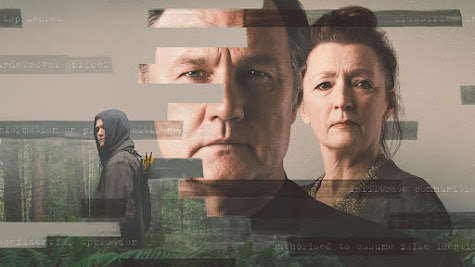I really enjoyed this series. Though if truth be told, my enjoyment probably peaked someway between the middle of the third of six episodes and the same part of the next one.
The best British detective shows tend to have a great sense of place and an earnest kind of soapiness, but this was almost next level, aiming at a sort of national therapy session and catharsis.
The plotting at first seemed intricate and then perhaps a little messy, but now that a second season has been commissioned some of this unresolved stuff can perhaps be threaded into the new pattern.
I was left wanting to know a bit more about what had pissed off Andy so much, so suddenly. Though this reaction was apparently a reworking of the seemingly motiveless (or motive undiscoverable) 2004 murder of Chanel Taylor by her father Terry Rodgers, who had walked her down the aisle just seven week earlier.
Terry found himself hiding in Sherwood Forest alongside former UDM miner Robert Boyer, guilty of killing and chopping up former NUM miner Keith "Froggy" Frogson with a sword.
Investigators initially believed the crime had something to do with the two men having taken opposing positions during the miners' strike twenty years earlier, but it turned out to be a bit more random.
Writer James Graham, decided to add the missing layer of meaning to these events in the neighbourhood of his own youth, serving us up with something more engaging than a mere procedural.
He has taken this story of the country's largest manhunt and added some ready-to-hand evocations of the Robin Hood myth, a hidden state-level conspiracy and a proper squall of emotionally-resonant dramatic tensions via a plethora of well-drawn characters — plus the real and perceived connections between them, both now and during the death throws of the local mining industry.
One's enjoyment will tend to peak as this slightly improbable concoction comes to the boil. As I mentioned at the start, around an episode and a half from the end.
The atmosphere is superb throughout though, and the characters feel real — due in no small part from the excellent performances — yet many of the situations they are placed in feel contrived. (The stand out amongst these being Lindsay Duncan's expositional cameo at Lord Byron's ancestral pad.)
I'm certain that Brits over 45 will get more out of this than almost any other audience members. Like Live Aid the following year, the unburied hatchets here are one of the key landmarks in our lived historical experience.
I picked up on a remark made right at the end, that Nottinghamshire is a kind of county in limbo, neither southern nor properly of the north. It made me reflect on how the English tend to comprehend their own geography, social and physical, and it occurs to me that while we are liable to absorb our impressions of rural England through literature, it is football that places the pins on the urban map.
In the lead up to 1984, when the miners were on strike (or indeed weren't), Nottingham possessed not only one of the more successful teams in the country, but also in Europe, yet ever since the fate of this club has reflected the relatively forgotten status of the city and its environs. So alongside this tale of hesitant coincidences we can slot the fact of the re-arrival this very year of "Notts Forest" in the Premier League.*
I won't discuss the aforementioned state-level conspiracy too much as this would involve spoilers, except to say that spy cops were real, though I was previously only aware of their insertion into more marginal insurgent communities like animal rights activists and Greenpeace-style eco-warriors.
I found Lindsay Duncan's analysis of the underlying role of Thatcher's government in all this was rather childishly condensed — made to sound serious because it came out of the mouth of a posh lawyer rather than a chippy old union comrade.
* Graham took some serious flak for this usage, out of the mouth of old-timer Gary no less.












